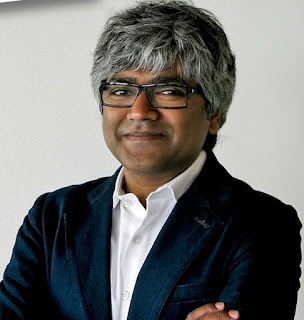 |
| Dr. Unni Karunakara |
As Dr. Unni Karunakara, international president of Médecins Sans Frontières (Doctors Without Borders), spoke recently as part of the Global Health Leadership Institute’s Spotlight Series at Yale about the 40-year history of MSF, I was transported back to the comfort of my living room where such humanitarian relief efforts were terrifying images thousands of miles away projected on TV screens or displayed in the paper.
When at first exposed to the stories of children starving in Biafra (reason enough to clean my plate in the early 1970s); Pol Pot’s slaughter of Cambodians and the resulting refugees crisis (genocide in real time); or the famine in Ethiopia of the 1980s the imagery soon becomes a lasting memory. As we become witness to more of these tragic events, it seems that our conscience inured and our capacity to react dulled. I checked-off from my mental record the list of countries and humanitarian disasters that rolled by during Dr. Karunakara’s slide presentation – each a stunning photographic portrait of victims of famine, genocide, natural disasters, armed conflict - in Somalia, Sudan, Liberia, Chechnya, Afghanistan, Rwanda, Haiti, Central America, Japan and more. Yet, this same timeline of disasters has been matched by unparalleled heroic efforts by MSF volunteers who embrace these events as opportunities for “action in the presence of failure,” providing assistance to people in their greatest time of need.
I realized then, as citizens of the world we have grown far too accustomed to assuming that violence, neglect or catastrophes will forever be present. The world is better for having MSF with its dual goals of providing humanitarian medical assistance as well as bearing witness - by speaking out to bring attention to these crises. Organizations such as Yale GHLI work in succession with MSF and other agencies providing humanitarian relief work and to help rebuild over the longer term infrastructure and systems for sustained health care delivery. And to our best ability we must all be both witnesses of and responders to human suffering.